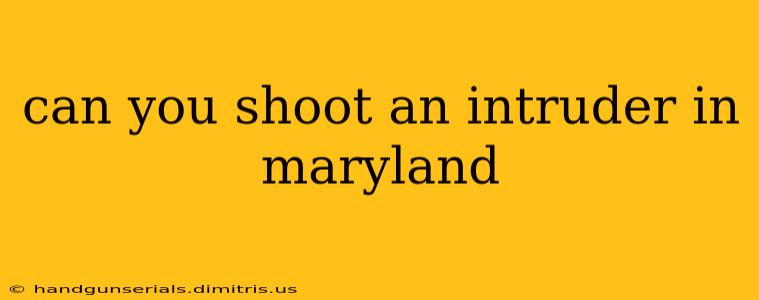Can You Shoot an Intruder in Maryland? A Comprehensive Guide to Maryland's Self-Defense Laws
The question of whether you can shoot an intruder in Maryland is complex and hinges on several critical factors. Simply put, Maryland law allows the use of deadly force, including shooting an intruder, only under specific circumstances. It's crucial to understand these limitations to avoid legal repercussions. This guide will explore the nuances of Maryland's self-defense laws related to intruders and home invasions.
Understanding Maryland's "Stand Your Ground" Law
Maryland doesn't have a "stand your ground" law in the same way some other states do. This means you are not legally obligated to retreat from your home before using deadly force. However, the right to self-defense is still subject to the "reasonable belief" standard.
When Deadly Force is Justified in Maryland
You can legally use deadly force, such as shooting an intruder, in Maryland if you reasonably believe that:
- You or another person is in imminent danger of death or serious bodily harm: This means the threat must be immediate and credible. A perceived threat based on speculation or fear is insufficient. The danger must be so serious that the use of deadly force is necessary to prevent death or grievous injury.
- The use of deadly force is necessary to prevent that harm: This implies that less lethal options were not available or feasible at the time. The intruder's actions must justify the use of deadly force as a last resort.
Important Considerations:
- Reasonable Belief: The key element is a reasonable belief. This is judged objectively, considering the circumstances as they appeared to a reasonable person in the same situation. Factors like the size and strength of the intruder, the presence of weapons, and the intruder's actions will be considered.
- Duty to Retreat (Outside the Home): While there's no duty to retreat from your home, Maryland law does generally require retreat if you are somewhere other than your home and can safely do so before using deadly force.
- Aggressor Exception: If you are the initial aggressor, you generally lose the right to use self-defense. This means if you provoked the confrontation, you can't claim self-defense.
- Mistaken Belief: Even if you honestly believe you are in imminent danger, if a reasonable person wouldn't have believed so, your use of deadly force might not be legally justified.
What Constitutes "Serious Bodily Harm"?
Maryland law defines "serious bodily harm" as injury that creates a substantial risk of death or that causes serious, permanent disfigurement or protracted loss or impairment of the function of any bodily member or organ. This includes, but is not limited to, severe lacerations, broken bones, internal injuries, and traumatic brain injuries.
After Using Deadly Force
If you use deadly force against an intruder, immediately call 911. Cooperate fully with law enforcement. Your actions will be thoroughly investigated, and providing truthful and accurate information is crucial.
Seeking Legal Counsel
This information is for educational purposes only and should not be considered legal advice. The specific circumstances of each situation greatly impact the legal implications. If you are involved in a situation involving the use of deadly force, immediately seek legal counsel from a qualified Maryland attorney.
This complex area of the law requires expert understanding. This guide provides a general overview; the specifics of your situation may vary significantly. Always prioritize your safety and the safety of others while adhering to the letter and spirit of Maryland law.

